Related Research Articles

Akira Kurosawa was a Japanese filmmaker and painter who directed thirty films in a career spanning over five decades. He is regarded as one of the most important and influential filmmakers in film history.
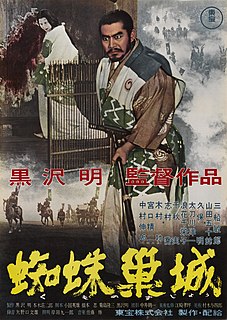
Throne of Blood is a 1957 Japanese jidaigeki film co-written, produced, edited, and directed by Akira Kurosawa, with special effects by Eiji Tsuburaya. The film transposes the plot of William Shakespeare's play Macbeth from Medieval Scotland to feudal Japan, with stylistic elements drawn from Noh drama. The film stars Toshiro Mifune and Isuzu Yamada in the lead roles, modelled on the characters Macbeth and Lady Macbeth.
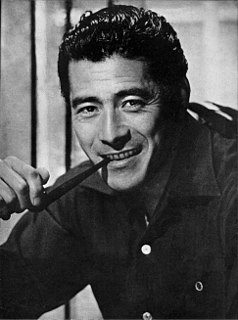
Toshiro Mifune was a Japanese actor who appeared in over 150 feature films. He is best known for his 16-film collaboration (1948–1965) with Akira Kurosawa in such works as Rashomon, Seven Samurai, The Hidden Fortress, Throne of Blood, and Yojimbo. He also portrayed Miyamoto Musashi in Hiroshi Inagaki's Samurai Trilogy and one earlier Inagaki film, Lord Toranaga in the NBC television miniseries Shōgun, and Admiral Isoroku Yamamoto in three different films.

Ishirō Honda was a Japanese filmmaker who directed 44 feature films in a career spanning 59 years. He is regarded as one of the most internationally successful Japanese filmmakers of the 20th century.

Kamatari Fujiwara was a Japanese actor.
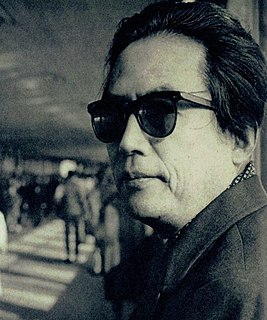
Shinobu Hashimoto was a Japanese screenwriter, film director and producer. A frequent collaborator of Akira Kurosawa, he wrote the scripts for such internationally acclaimed films as Rashomon and Seven Samurai.

Madadayo is a 1993 Japanese comedy-drama film. It is the thirtieth and final film to be completed by Akira Kurosawa. It was screened out of competition at the 1993 Cannes Film Festival. The film was selected as the Japanese entry for the Best Foreign Language Film at the 66th Academy Awards, but was not accepted as a nominee.
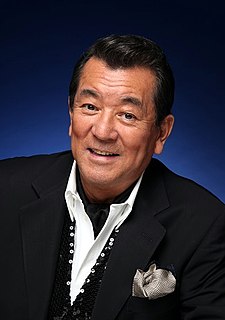
Yūzō Kayama is a Japanese popular musician, singer-songwriter and actor.
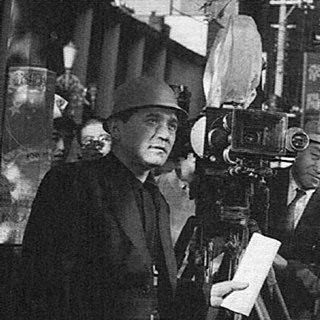
Motoyoshi Oda was a Japanese filmmaker who directed over 50 films in his career.

Masaru Sato was a Japanese composer of film scores.

Ichirō Arishima was a Japanese comedian and actor. Nicknamed "The Japanese Chaplin", he is best known outside Japan for his appearance as Tako, the promoter of King Kong in King Kong vs. Godzilla (1962).

Fumio Hayasaka was a Japanese composer of classical music and film scores.

Senkichi Taniguchi was a Japanese film director and screenwriter.
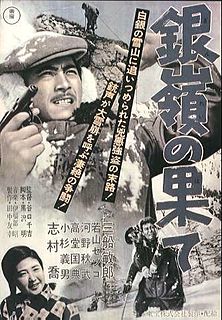
Snow Trail is a 1947 black-and-white Japanese film directed by Senkichi Taniguchi from Akira Kurosawa's screenplay. It was the first film role for Toshirō Mifune, later to become one of Japan's most famous actors. Mifune and the other main actor in the film, Takashi Shimura, later became long-term collaborators of film director Akira Kurosawa.

Stuart Eugene Galbraith IV is an American film historian, film critic, essayist, and audio commentator.

Kajirō Yamamoto was a Japanese film director, screenwriter, and actor who was known for his war films and comedies and as the mentor of Akira Kurosawa. The combined list of his efforts as a director for documentaries, silent, and sound films includes over 90 film titles during his lifetime.
Sōjirō Motoki was a Japanese filmmaker who served primarily as a film producer, but also as a writer and director. He was most famous for producing several films for Akira Kurosawa, including Seven Samurai, Ikiru and Throne of Blood. He also produced films for other directors, including Mikio Naruse, for whom he produced Spring Awakens and Battle of Roses, and Kazuo Mori, for whom he produced Vendetta for a Samurai. As a writer, he provided the story for Kei Kumai's 1968 film The Sands of Kurobe, starring Kurosawa favorite Toshiro Mifune.

Yoko Mizuki was a Japanese screenwriter. Born in Tokyo, she later graduated from Bunka Gakuin and began writing screenplays to support her family after her father died. Mizuki was active in the 1950s era of the Japanese studio system and is notable for her work with directors Tadashi Imai and Mikio Naruse. Her work had received several Best Screenplay Awards from Kinema Junpo and has been described in the book Women Screenwriters: An International Guide as "One of the most important and accomplished Japanese female screenwriters of all time".
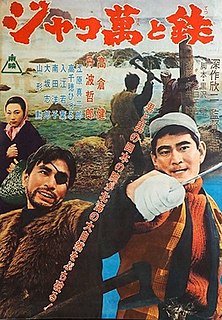
Jakoman and Tetsu, also known as One-Eyed Captain and Tetsu is a 1964 Japanese film directed by Kinji Fukasaku based on an earlier screenplay by Akira Kurosawa and Senkichi Taniguchi that was based on the novel Nishin gyogyo by Keizo Kajino. The screenplay had previously been filmed by director Senkichi Taniguchi in 1949.
References
- ↑ The Films of Akira Kurosawa. University of California Press.
- ↑ Richie, Donald. "The Films of Akira Kurosawa". University of California Press – via Google Books.
- ↑ The Toho Studios Story: A History and Complete Filmography. Scarecrow Press. 16 May 2008. ISBN 9781461673743.
- ↑ "65 years ago today: Kurosawa penned Tetsu of Jilba released".